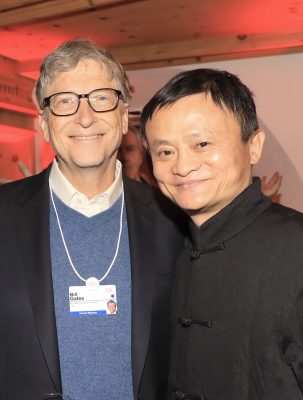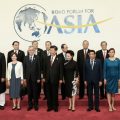
Microsoft founder Bill Gates suggested that Jack Ma, the Chinese billionaire who is stepping down as chairman of e-commerce giant Alibaba next year, use his digital prowess to improve financial services in poor regions.
“We should all look forward to him bringing the same type of new thinking and energy to philanthropy that he brought to the success of Alibaba,” Gates said during an online interview with Chinese media last week.
Ma recently announced his plan to retire on Sept 10, 2019 and hand over the leadership of the $400 billion e-commerce juggernaut to Daniel Zhang, the current CEO.
Gates said he had not exchanged thoughts with Ma on his retirement plan, but he believed in Ma’s capability to advance philanthropy in a Chinese context.
“I’m sure his experience in the digital world-just like I did with mine-will help inform ways that we can use digital approaches in areas like health, education and helping people with savings,” he said.
Gates singled out Ant Financial, a financial services company affiliated with Alibaba, for its philanthropic potential.
“Ant Financial offers valuable experience in the digitization of money and lowering transaction costs,” he said.
Low transaction fees enable poor people to devote more money to purchasing necessities or covering tuition fees for their children, and the Gates Foundation has already worked with the company to promote digital currencies in India, according to Gates.
“There’s a saying that from those to whom much has been given, much is expected. Jack could be a really strong example of that,” Gates said.
Earlier this month, Ma told Bloomberg that he could never be as rich as Gates, but “one thing I can do better is to retire earlier”.
He delivered on his promise by announcing last week that he would retire at 54, four years ahead of Gates who stepped down as chairman of Microsoft at 58 in 2014.
His planned departure and commitment to charities fueled discussions on China’s social media, as such a move is unusual for a business leader of his prominence.
Deng Guosheng, deputy director of the Institute of Philanthropy at Tsinghua University, told China Daily that Ma’s decision to retire is rare.
“China’s rapid economic growth has brought plenty of good corporate leaders, and we are now in urgent need of excellent philanthropists with a corporate background,” he said.
“But some cultural stigmas, such as misunderstanding of donations from the rich, and policy restrictions related to taxation and foundation registration, have hampered their activities,” Deng said.
“Ma’s commitment to philanthropy sets a great example to foster other business leaders’ charitable ambitions, and we are looking forward to seeing more people follow his step.”


